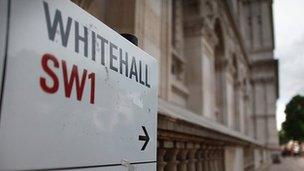Audit Office questions value for money of quango cull
- Published

Whitehall lacks a grasp of the ongoing cost of getting rid of culls, MPs say
The government is "not doing enough to secure value for money" as it goes about scrapping scores of quangos, the National Audit Office has said.
The NAO said departments had underestimated the cost of transferring functions from the axed public bodies to other parts of Whitehall.
The bill for the transition would be at least ÂĢ830 million, it said.
The Cabinet Office said it had always accepted there would be "one-off costs" and put those at up to ÂĢ900m.
Quangos - quasi-autonomous non-governmental organisations - are bodies funded by taxpayers, but not controlled directly by central government.
The government announced in October 2010 that 192 would scrapped from 2014 and many more merged.
Since then a number have been granted a reprieve, including the Parole Board and the Criminal Cases Review Commission, but others such as the Audit Commission and the British Film Council are still due to go.
Ministers say the changes will save ÂĢ2.6bn by 2014/15, but the NAO warns that target could be in doubt due to the costs of transition.
Accountability
The overhaul will see Whitehall departments take over the functions of 65 public bodies, while those of another three will be transferred to local government.
The NAO said the reorganisation was "on course", but departments "do not have a good enough grasp of the ongoing costs of functions being transferred to other parts of government, or of the one-off transitional costs of the changes".
It also questioned how far the quango cull would go towards achieving the government's aim of improving accountability.
Of the ÂĢ64bn of taxpayers' money spent by the newly reorganised public bodies, ÂĢ20.6bn will be subject to greater scrutiny by elected politicians, but the rest - more than ÂĢ43bn - will still remain outside their direct control.
Amyas Morse, head of the NAO, said: "The Cabinet Office and departments will have successfully achieved the largest restructuring of public bodies for many decades, and provided clearer accountability to elected politicians for some spending, if they succeed in carrying through all the changes they plan.
"However, they are not doing enough to secure value for money.
"I would expect departments to have a better grasp of the costs of reorganising bodies and of carrying on functions that have been transferred."
'Sub-total'
The NAO said the total bill for the transition would be at least ÂĢ830 million - almost double the ÂĢ425 million first suggested by the government.
But the Cabinet Office said that figure was the "sub-total of departments' initial cost estimates provided to the NAO".
"We have never claimed that this is the complete picture, which is why our current estimate is in the range of ÂĢ600 million to ÂĢ900 million," a spokesman said.
"This factors in the range of potential costs where departments are not yet in a position to give robust figures."
He added: "It is not true to say that the government has underestimated the cost of reform and it should be noted that our own estimates overlap with those provided by the NAO."
- Published1 March 2011
- Published7 January 2011
- Published14 October 2010